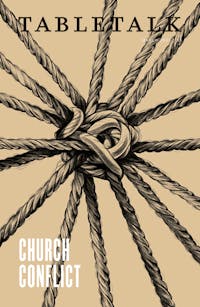
Request your free, three-month trial to Tabletalk magazine. You’ll receive the print issue monthly and gain immediate digital access to decades of archives. This trial is risk-free. No credit card required.
Try Tabletalk NowAlready receive Tabletalk magazine every month?
Verify your email address to gain unlimited access.
Can you imagine the discomfort the people in Antioch felt when Paul confronted Peter, as described in Galatians 2? You probably remember the story: Men from Jerusalem had come to the church in Antioch. Their visit created a division. Instead of Jews and gentiles worshiping and fellowshiping freely together, some of the Jews (even Peter and Barnabas) withdrew from the gentiles. Paul told the Galatians that he had confronted Peter “before them all” (v. 14). Was it during a love feast or immediately after the benediction? Did Paul catch Peter in the courtyard or denounce him in the middle of a sermon?
Although we don’t know the answers to those questions, you might wonder whether it was wrong for Paul to confront Peter in this way. Shouldn’t he have followed the steps outlined in Matthew 18? No, Galatians 2 and passages such as Acts 5 and Philippians 4 demonstrate that there are times when a public confrontation of sin and error is necessary for the health and well-being of the church.
Paul confronted Peter publicly and immediately when he witnessed public sin. By withdrawing from the gentiles, Peter had acted in a way that denied the gospel. Paul didn’t hesitate to condemn Peter publicly because the sin was public. This same principle is demonstrated in Acts 5, where Peter confronts Ananias and Sapphira for lying to the Holy Spirit when they deceitfully kept back some of the proceeds of the land they had sold to give to the church. Their sin was public, and so the condemnation of the sin was public. The same principle is seen in Philippians 4:2, where Paul “entreats” Euodia and Syntyche “to agree in the Lord.” Although we don’t know what led to the breach between these two sisters, their disagreement was public and so Paul’s confrontation of the sin—though less forceful than in Galatians 2 or Acts 5—is also public. The principle on display in each of these passages is that public confrontation of sin and error is necessary to correct public sin and error.

Another principle we can derive from these texts is that public confrontation of sin and error is done in the context of the local church. Unfortunately, we live in an age of self-appointed “Pauls” who roam the internet seeking “Peters” to denounce. We may be tempted to turn to Galatians 2 to justify our taking up of electronic pitchforks in pursuit of theological villains. The principle of Galatians 2, Acts 5, and Philippians 4, however, is that such confrontation belongs in the context of the local church, where the sin and error is experienced and where the sinner can be held accountable.
A third principle is implicit in these texts. There are not many examples of this kind of public confrontation of public sin and error, but the ones we have address serious threats to the church. Peter’s conduct was not in step with the gospel. Ananias and Sapphira’s sin threatened the very existence of the church—akin to Achan’s sin after Israel crossed into the promised land (Josh. 7). The breach between Euodia and Syntyche threatened the unity of that church. That there are few examples of this kind of public rebuke tells us that not all errors—not even all public errors—need to be confronted publicly. But when a public sin or error threatens the very existence of the church, or even the gospel itself, a public rebuke may be necessary.
In 1553, a struggle broke out in Geneva over who had the authority to excommunicate. The town government wanted Philibert Berthelier readmitted to the Lord’s Supper. Berthelier, an opponent of John Calvin and attorney for the heretic Michael Servetus, had been excommunicated for rebellion. On the day the Lord’s Supper was to be observed, Berthelier and his friends packed St. Pierre’s Church, sitting near the front. Calvin, however, refused to serve communion to any “despisers of sacred mysteries.” He said, “These hands you may crush; these arms you may lop off; my life you may take; my blood is yours, you may shed it; but you shall never force me to give holy things to the profane, and dishonor the table of my God.” Such boldness is necessary in the face of public sin and error. May God give His ministers courage to take such steps to protect the church’s purity and peace.
